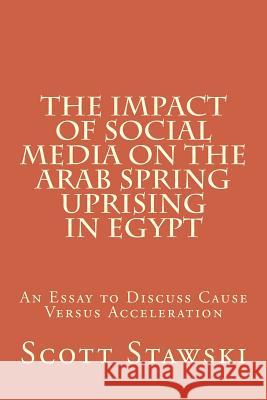The Impact of Social Media on the Arab Spring Uprising in Egypt: An Essay to Discuss Cause Versus Acceleration » książka
The Impact of Social Media on the Arab Spring Uprising in Egypt: An Essay to Discuss Cause Versus Acceleration
ISBN-13: 9781517549053 / Angielski / Miękka / 2015 / 36 str.
The Impact of Social Media on the Arab Spring Uprising in Egypt: An Essay to Discuss Cause Versus Acceleration
ISBN-13: 9781517549053 / Angielski / Miękka / 2015 / 36 str.
(netto: 20,51 VAT: 5%)
Najniższa cena z 30 dni: 21,54
ok. 16-18 dni roboczych
Bez gwarancji dostawy przed świętami
Darmowa dostawa!
The focus of this essay is to provide an analysis of the effect of social media on the Arab Spring uprising in Egypt in 2011. What has now been coined the "Arab Spring" began with protests in Tunisia in late 2010. It then quickly spread to countries throughout the Middle East and North Africa. It resulted in national leadership changes in Egypt as well as Tunisia, Yemen and Libya. In Egypt, President Hosni Mubarak ended his presidency on Friday, February 11, 2011 as a result of the actions of protestors, numbering in excess of 2 million in Egypt. Communication mechanisms always play a role in grass root uprisings which have led to national leadership changes. There has been much discussion and some academic work on what part social media played in Egypt's Arab Spring uprising. Some even credit the start of the Arab Spring uprising in Egypt with a Facebook page administered by Wael Ghonim. The site, We are all Khaled Saeed, brought worldwide attention to the death of Khaled Mohamed Saeed; a young Egyptian man that died while in police custody. This essay seeks to understand what impact social media played on the Arab Spring uprising in Egypt. Was social media simply a communication tool utilized in the Arab Spring uprising in Egypt? Or, was social media in Egypt more than a tool. Was it an accelerator to the eventual outcome of the uprising?
Zawartość książki może nie spełniać oczekiwań – reklamacje nie obejmują treści, która mogła nie być redakcyjnie ani merytorycznie opracowana.











